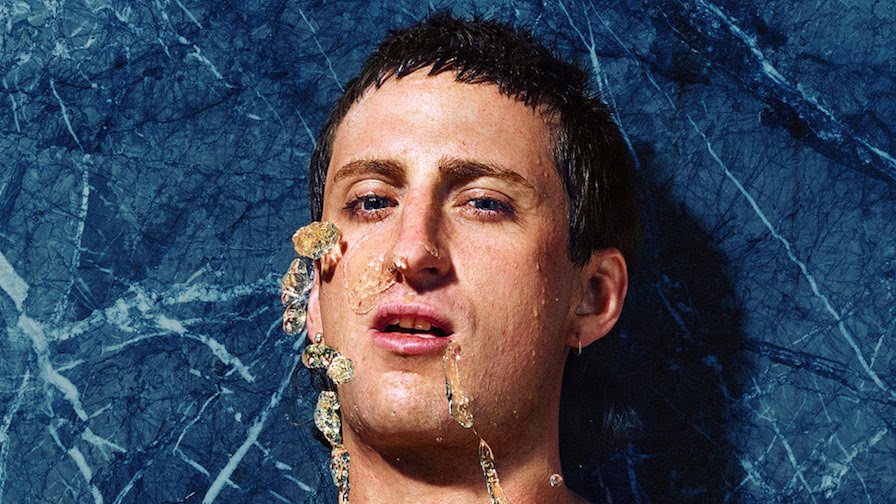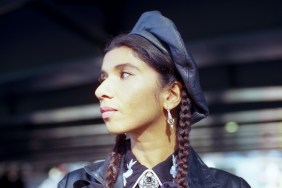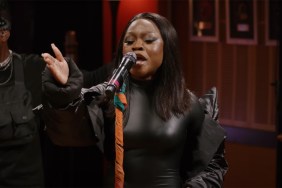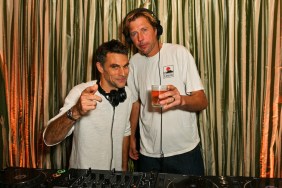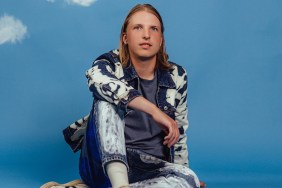Love him or hate him, there’s no denying Kirin J Callinan. The wild and weird singer, songwriter and guitarist originally made his presence felt through Sydney band Mercy Arms and in the fold of Jack Ladder’s backing band, The Dreamlanders. Since branching out on his own, however, he’s become one of indie rock’s most fascinating and polarising figures. His solo debut, 2013’s Embracism, saw his dark and confronting songs win him fans as diverse as Mark Ronson, TV on the Radio, Yeah Yeah Yeahs and The Presets. The four years since its release have taken him across the world and back, touring extensively and piecing together what would become his follow-up LP.
Entitled Bravado, the album paints Callinan in a completely new light – there’s rave beats, towering synths and a guest list that ranges from Mac Demarco to Jimmy Barnes (seriously). It’s a further reinvention of an artist that has never been content to stay in the same spot.
Prior to the album’s release, Callinan – in a slightly disoriented but incredibly entertaining state – talked through the making of Bravado and how it’s hip to be square.
Music Feeds: We’ve caught you on tour in the U.S. – how goes the land of the free for an artist like yourself?
Kirin J Callinan: It goes well – although I do miss my island home. I’m on a balcony overlooking downtown Los Angeles, sort of towards the Chinatown area. The sun is out, although it’s just ducked behind some clouds. It’s just before 6 pm, and I’m getting a bit of sun – which is nice. I’ve been on the road for the past three weeks. We went through Canada and came down through the North-West of the US, into the mid-west and north-east. It’s been pretty cold and dank for the most part, but being in the sun now is quite cleansing.
MF: Are you performing solo or do you have a troupe performing with you on this run?
KJC: I’ve got my band with me – Mahne, one of my keyboard players; this is his first time in the US. We’re here with our friend Tex, and we picked up a guy in Toronto called Ellis. I ran into him there – I mean, we literally ran into him. He was a pedestrian, and we hit him. Thankfully, he wasn’t too pissed about it – he even joined us on tour. He’s a great bass player, even with a broken arm. We’d normally be out here with our drummer Dave, who’s been a big part of the band for the last couple of years. Unfortunately, he’s a bit too busy right now – you’ll see him playing with every pop beat-maker in the country, it seems. I love Dave, of course, and it’s been great travelling around with these guys. The shows have been sold out; and the crowds are all young, beautiful and enthusiastic. I’m jazzed.
MF: It’s interesting that you describe your crowd that way – especially considering the last time you played in Sydney, it was to an audience that was the direct opposite of young, beautiful and enthusiastic. How did you take that reception opening for Crowded House?
KJC: [laughs] No! No! I felt embraced. There was an element of confusion there, certainly – and there were people that were confused and angry. For the most part, though, I feel like the crowds were confused and excited. I would also beg to differ regarding your description – they were beautiful. They may not have been on the younger side, but pockets of them were certainly enthusiastic. The whole event was glorious – a national event. The impact that Neil [Finn]’s songs have had on the national psyche cannot be overstated. To be able to share that moment with them four nights in a row was fucking unbelievable. I will never forget it. If there were people in that crowd that didn’t like my show, I couldn’t care less. It was such an amazing time for me.
You know what? I think the reason that Neil personally asked us to do the shows is because he saw a little bit of Split Enz in us. He said himself that, in their early days, they were divisive too. People loved to hate them. His advice was to take it, grow with it and accept it for what it is. That’s powerful in itself.
MF: You played some new songs at that run of shows, and have been playing new material incrementally ever since Embracism came out back in 2013. How much of what you’ve been playing live over the last few years made it onto the final cut of Bravado?
KJC: I had the ambition to get to work right away after Embracism. I had a vast chunk of an album done that I recorded over in London back in 2014. The foundation of what would become Bravado hasn’t changed all that much. The core of the songs was more or less settled around the middle of 2015. If I’d been inspired to do so, I could have easily put the album out then. It took me having some time away from it for me to learn to love it for what it was. Pardon the pun, but I learned to embrace its flaws. It’s an ugly, bombastic, dumb, smutty mess – but that’s where its depth is. That’s where its humanity is. That’s where its beauty is. I had to wrap my head around it in order to be inspired enough to finish it off.
After that inspiration kicked in, a bunch of people came on board as collaborators. People like Jimmy Barnes, the Finns, Weyes Blood and Mac Demarco all came in towards the end. That was really inspiring. The love and support that they gave to me, to the point that they would proudly put their name next to mine on the record… it was just so cool. At the end of the day, I would say that’s the most important thing about this record for me. There’s a sense of community to this album for me. It’s international. It’s cross-generational. To be able to stand alongside these musicians is truly surreal.
MF: It brings up an interesting point: You’re a very identifiable solo artist in your own right, but a lot of your music has been written on a collaborative basis. People like Jack Ladder and Donny Benet have been key players in your music; and Bravado, as you mentioned, brings in a lot of different musicians as a part of the process. Is there a common thread that links these artists together? Is there a unifying theme to what makes a great collaboration in your eyes?
KJC: I love this line of questioning because I love to talk about my mates. [laughs] Is there a throughline… [pauses] Having a sense of humour would be one, absolutely. Getting excited, too, is one. It’s hard to get excited about making music when you’re just chipping away in your bedroom by yourself at 4 in the morning. When you’re with someone else, it’s just a whole lot more fun. It’s like masturbating. [laughs] It doesn’t matter if the music is really sincere or really absurd – it’s about the excitement that goes into making it. Guys like Donny and Laurence [Pike] are all over this record – Donny played a lot of fretless bass, Laurence played a lot of the drums. Tim [Rogers, AKA Jack Ladder] didn’t play on this record, but he was very supportive throughout the entire process – he’d often be the first person that I’d play the songs to. To be able to share without fear of judgement is such a powerful form of intimacy. It makes it all worthwhile.
What I like about the record is that there’s such a mix of old friends – like the ones I just mentioned – and new friends. Mac Demarco is a new friend, for instance. We’ve been hanging out for a couple of years now – he’s taken me out on the road, I’ve stayed at his house. Aaron, my producer, had a big share in this record as well. Everyone has had a hand in making this music possible. That’s what’s made it all worthwhile. [pause] …oh, and getting really fucking drunk. That’s a key to collaboration! [laughs] Imagine doing it by yourself – that’s not healthy!
MF: Do you feel as though opening yourself up in such a fashion has allowed for this record to be as diverse and eccentric as it is?
KJC: I guess so. Very early on, I was ready to do away with the idea of this record sounding “cool”. I wanted to use pop devices – whether it was stacked MIDI synths, or the EDM stuff. Even in the lyrics – they’re either very sincere or they’re very silly. ‘S.A.D.’, for example, was possibly the dumbest lyric I could have possibly come up with. That’s why I went for it. The title track, ‘Bravado’, is the direct opposite – it’s something that’s so earnest. I guess, on the whole, I just wanted this record to be fun and inclusive.
With Embracism, I had my guard up. It was a violent, defensive record. Maybe people may see this record as defensive in a different sense – they might sense that the use of absurdism or irony could be something that I’m hiding behind. To me, that’s part of the tapestry of this record. There’s a humanity to it. There’s some sort of narrative or portrait of the individual. Maybe I’ve gone too far the other way – maybe I’m hiding behind bombast. That’s all part of the process. At the end of the day, I’ve just to put it out and move on. I’ll make another one, and another one… and another one… and eventually be done. Who gives a fuck?
My absolute favourite music is not my favourite music because it’s “cool”. It’s because of what it gives to the listener. It’s about how generous it is. To bring it full-circle, Crowded House is a great example of that. They’re this sort of band with incredible songs that cut through and access this part of the heart that no-one else does. They’re not cool, though. The songs aren’t cool. It cuts even deeper because of that. It does away with that pretence. I wanted to do that for this record. I wanted to get better at that as I went along. It’s not about me. It’s too much about me, I think. It should be about anyone who cares to listen.
–
‘Bravado’ is out tomorrow, June 9th. Pre-order a copy here.
